Burning Alone
Reflections on the philosophical spirit of Burning Man
I survived my first Burning Man: a week of dust and rainstorms, of loneliness and communion, of camaraderie and depravity; a week both clarifying and disorienting, brutal and beautiful; a week I am grateful to have experienced and glad to have concluded.
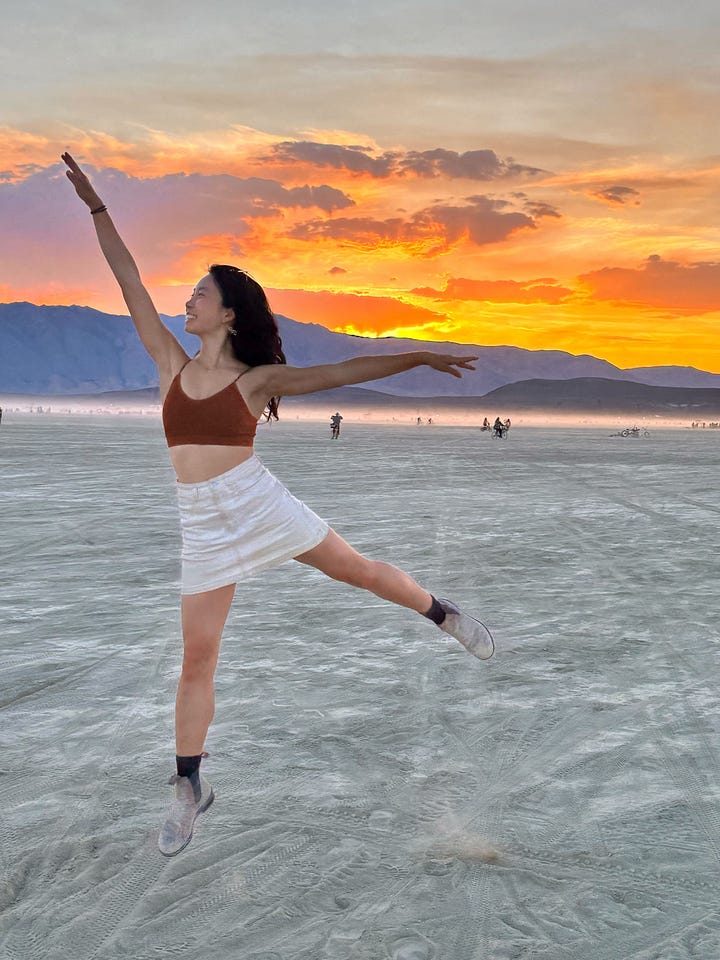
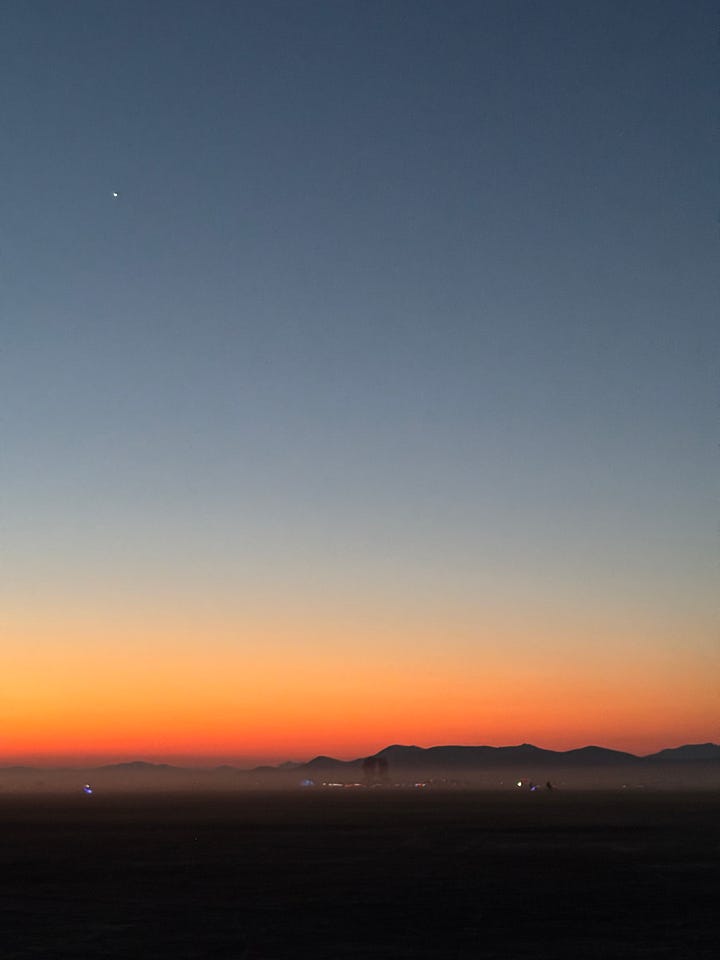
If you’re not familiar with Burning Man, here’s a quick primer. Every year, tens of thousands of people descend upon Nevada’s Black Rock Desert, where a one-week “city” is erected and torn down without a trace. The city is governed by 10 Principles — radical self-reliance, inclusion, self-expression, gifting, immediacy, among others — aimed at creating a society that is participatory, non-commercial, and, ideally, more creative, communal, and free.
I went because I wished to participate in an alternative way of living, in a society governed by different norms than our default. What happens when we remove money from the relational equation; when we welcome the stranger rather than suspect or disregard them; when we are encouraged to present ourselves — however flamboyantly or demurely, clothed or unclothed — as we wished? What happens when a community attends to norms of generosity and reciprocity? What emerges when the default is not to consume but to contribute and create; when art and music are considered not luxuries but necessities? What if we could — literally, physically — build a different way of living from the dusty ground up?
What I experienced was not a desert utopia, as Burning Man is often sold, but something closer to what Ivan Illich called conviviality: of “individual freedom realized in personal interdependence,” where human autonomy, skillfulness, and creativity are expanded. To Illich, a desirable future depended on choosing a life of action over a life of consumption, on “engendering a lifestyle which will enable us to be spontaneous, independent, yet related to each other.” Burning Man offered me a clearer glimpse of what that might feel like in practice.
One of Burning Man’s core principles is radical self-reliance: the encouragement of individuals to “discover, exercise and rely on their inner resources.” What this looks like in practice is the expectation that every person brings everything they need to survive with them at all times, in any scenario: goggles, water, food, dust mask. Yet, this is not meant to promote an individualism and disregard for others. Another principle, participation, holds that “transformative change, whether in the individual or in society, can occur only through the medium of deeply personal participation.”
In our world today, individual interest and the common good are often believed to be in tension. But, as Tocqueville asserted in his concept of “self-interest rightly understood,” the two need not be in conflict. An “enlightened regard,” he wrote, “constantly prompts [people] to assist one another.” In the harsh conditions of the desert, this was brought into starker clarity: each of us is inextricably tied to the other— not only for connection, but also for support when things break down and our self-sufficiency inevitably falters. It is in our self-interest to lend a hand to others, even absent any tie or obligation to them, because strengthening the collective trust will create a culture of mutual obligation that ultimately serves us all.
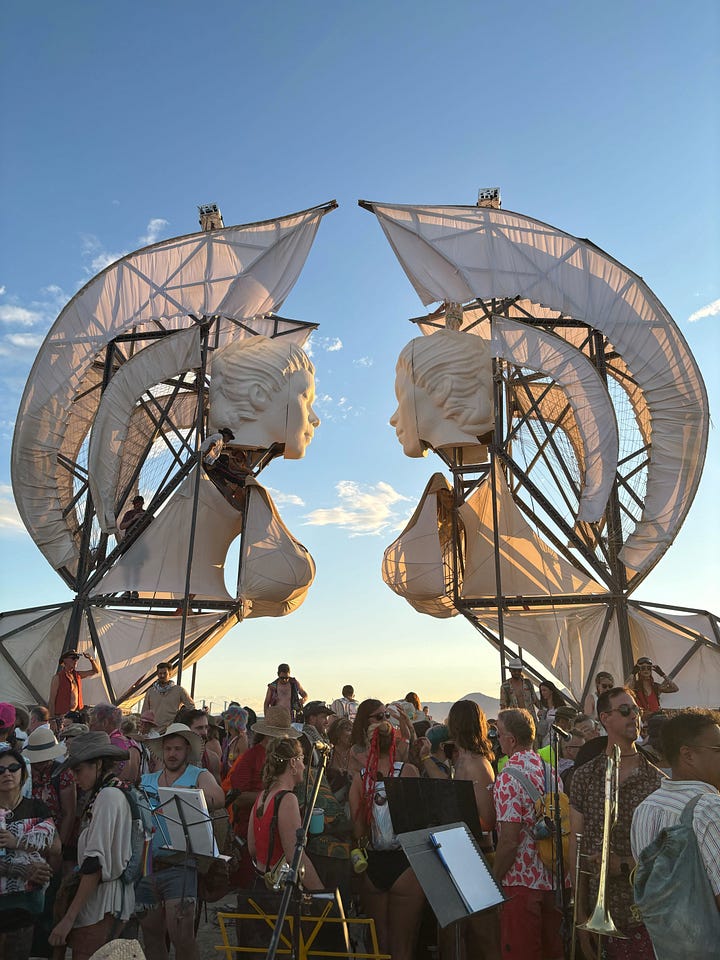
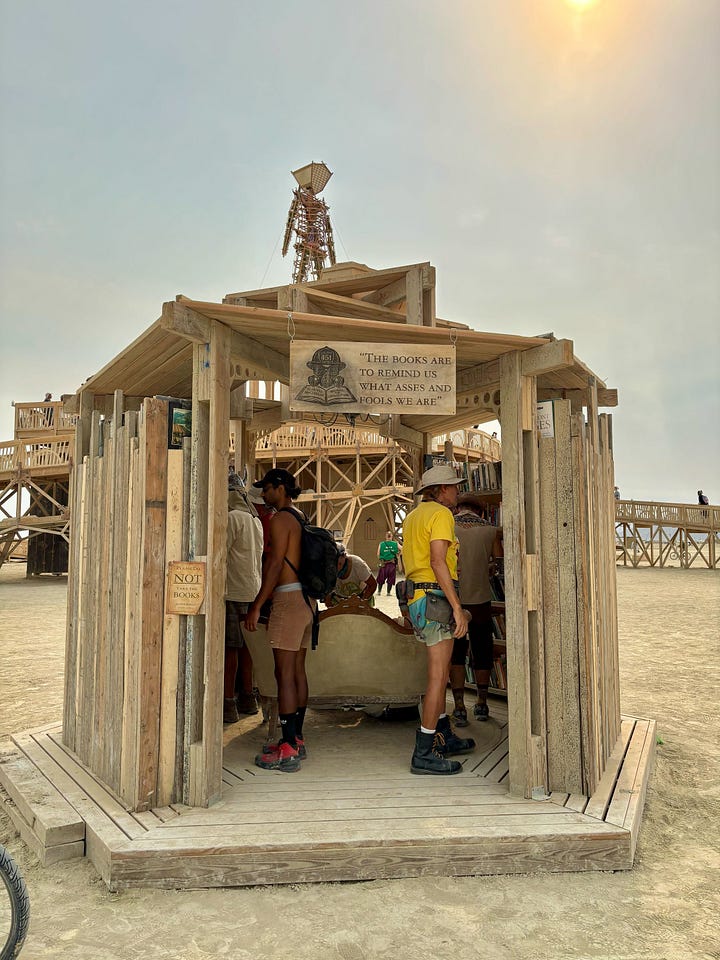
The playa was not a gentle place to learn such lessons. The first few days brought 50-mile-per-hour dust storms and downpours that bent metal poles, tore through tarps, and dampened spirits. Some veteran Burners said it was the worst weather they had experienced in over a decade; others packed their bags and left. We spent the first few days rebuilding our camp infrastructure, which offered its own education: mastering the impact driver, deciphering poorly-written carport instructions, lag-bolting and bungee-strapping tents and poles and tarps beneath the unforgiving sun.
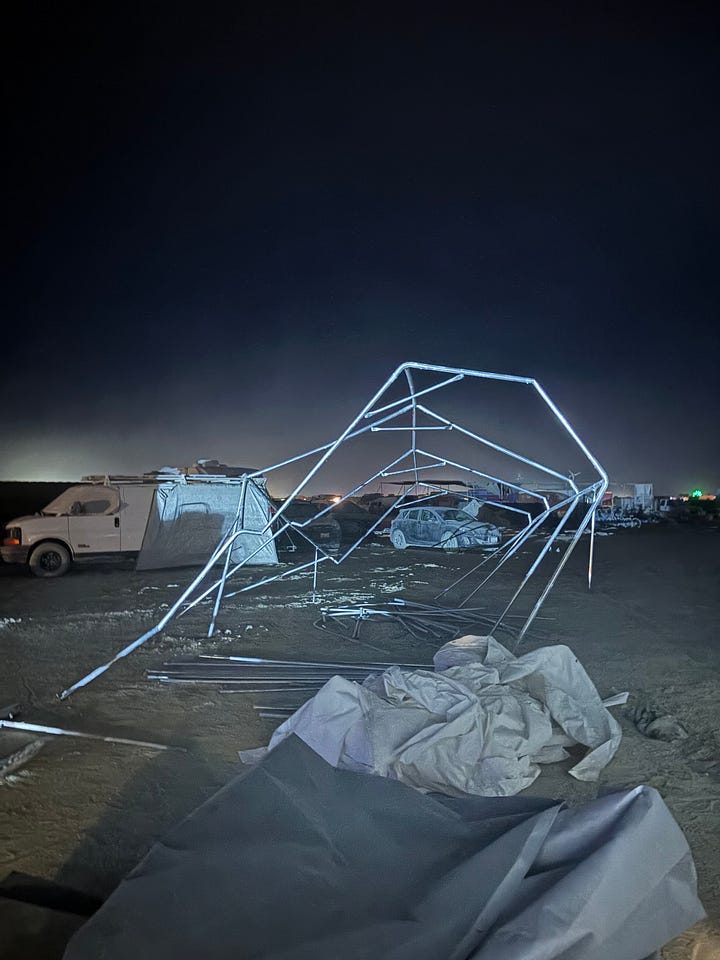
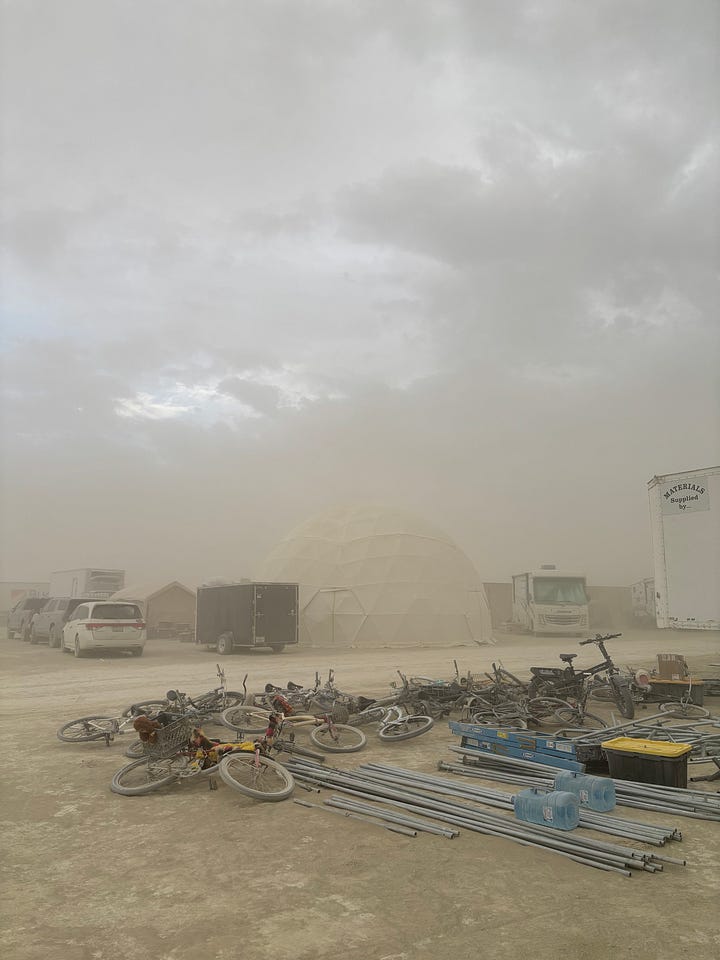
As the skies cleared and the mud dried, I ventured to the Black Rock Public Library, run by volunteers who hauled thousands of books to the desert and threatened unspeakable consequences if a volume were not returned within a year. From there, I checked out a copy of Robert Putnam’s Bowling Alone. Published in 2000, even before the emergence of digital social networks, the book chronicled the unraveling of American community life: the decline in civic associations, religious groups, and hobbyist communities like bowling leagues. Such institutions, Putnam argued, were sustained by a principle he called “generalized reciprocity”: the willingness to do something for another without expecting anything immediately in return, with faith that others will do the same.
In the days that followed, I observed this ethic everywhere. A woman, seeing me peer into a tent where she and her campmates were dancing, waved me in and poured me a hot cup of spiced coffee. A neighboring camp braved the storms to deliver steaming bowls of tonkotsu ramen, crowned with fatty chashu slices and slivers of green onions. Strangers jumped into an impromptu jam session, harmonizing seamlessly without speaking a word or even knowing each others’ names. Everywhere, there was an eagerness to contribute: a helping hand, a listening ear, a hot meal, a cold drink, a photograph, a song.
Too often today, community is treated as a product, created for our convenience and enjoyment, yet requiring little obligation. We forget that community is not an established entitlement but an ever-evolving practice, sustained through countless small acts and decisions that its members make each day. Every gesture can strengthen or erode trust and mutuality: a piece of litter discarded or retrieved, a hand extended in help or eyes averted in indifference. To be part of something is to give a piece of yourself to it, and to trust that, in turn, it will shape and stretch you beyond what you could do alone.
As I biked around the playa throughout the week, I often thought of this Steve Jobs quote: “Everything around you that you call life was made up by people that were no smarter than you, and you can change it, you can influence it, you can build your own things that other people can use.” It was astonishing to realize that every structure, every artwork, had been made by someone on the playa, who had spent hours, days, weeks, into realizing an idea, for no practical reason other than sheer beauty and inspiration.
Some of my favorite pieces, pictured throughout this piece:
Clarisse McLellan Manual for Civilization: a Fahrenheit 451-inspired library filled with banned books that people could rescue before the library burned with the Man (I saved Montaigne’s essays and Weber’s Protestant Ethic!)
Kauyumari Ceremonial Center: a hollow Wixárika deer studded with corn kernels, beads, and stained glass
Ad Astra: a Stonehenge-esque arrangement topped with stainless steel, bridging prehistoric and futuristic design
Moth: representing three facets of human striving: will (sword), understanding (book), and exploration (lantern)
Being in proximity to these works reminded me that awe-inspiring creations are not just made by professionals or masters of the past, but by ordinary humans like you and me, who dare to dream up strange, whimsical, improbable things and bring them into the world, not because they serve any practical utility, but because they delight, move, and remind us of what a gift it is to be human: the long history and rich cultures we’re embedded in, the creativity that springs forth when we are free to play without purpose. It gave me hope that, whatever the future looks like, wherever we may go, we’ll find a way to come together and make and marvel at beauty.
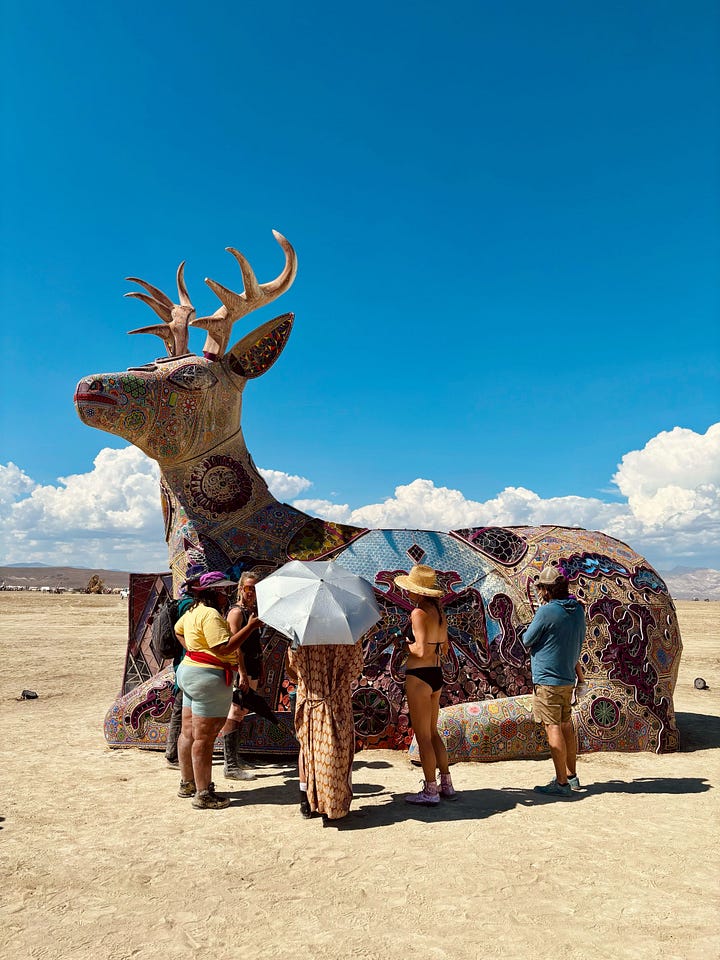
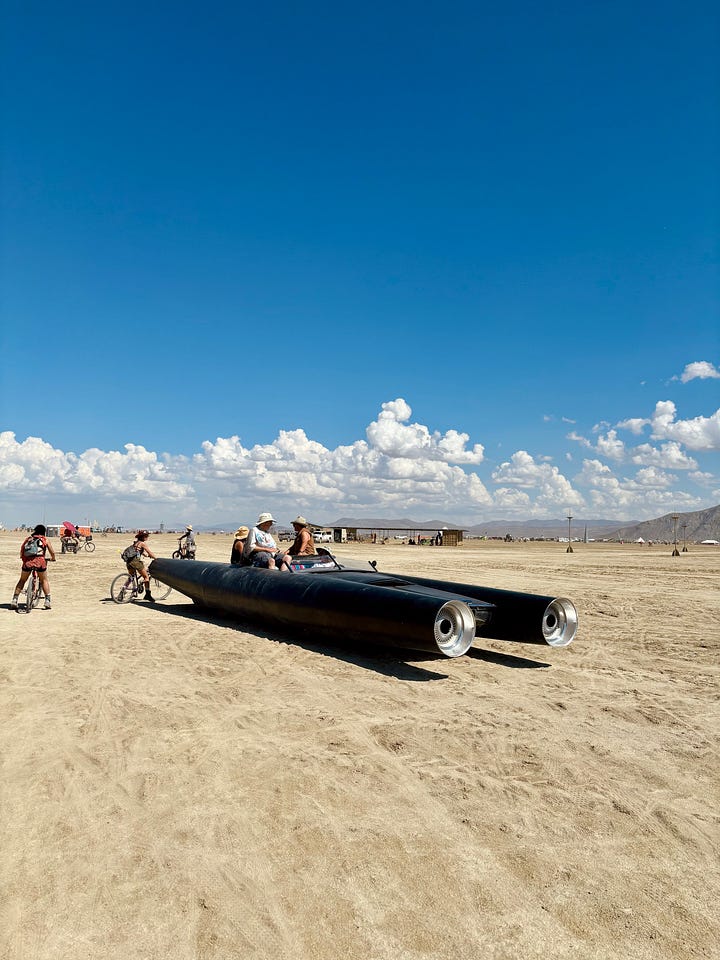
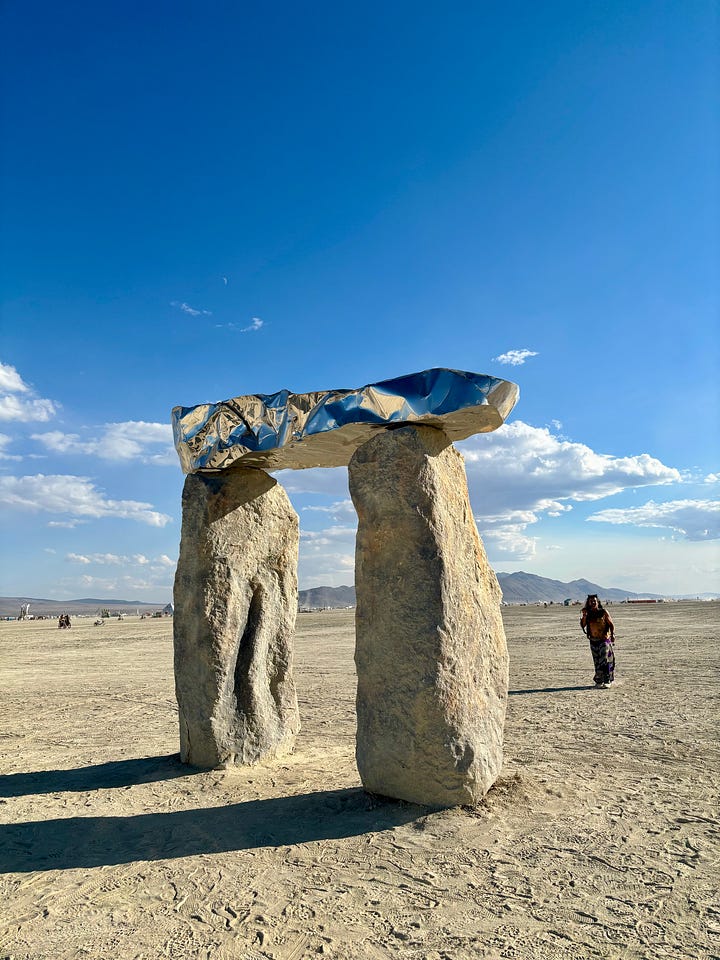
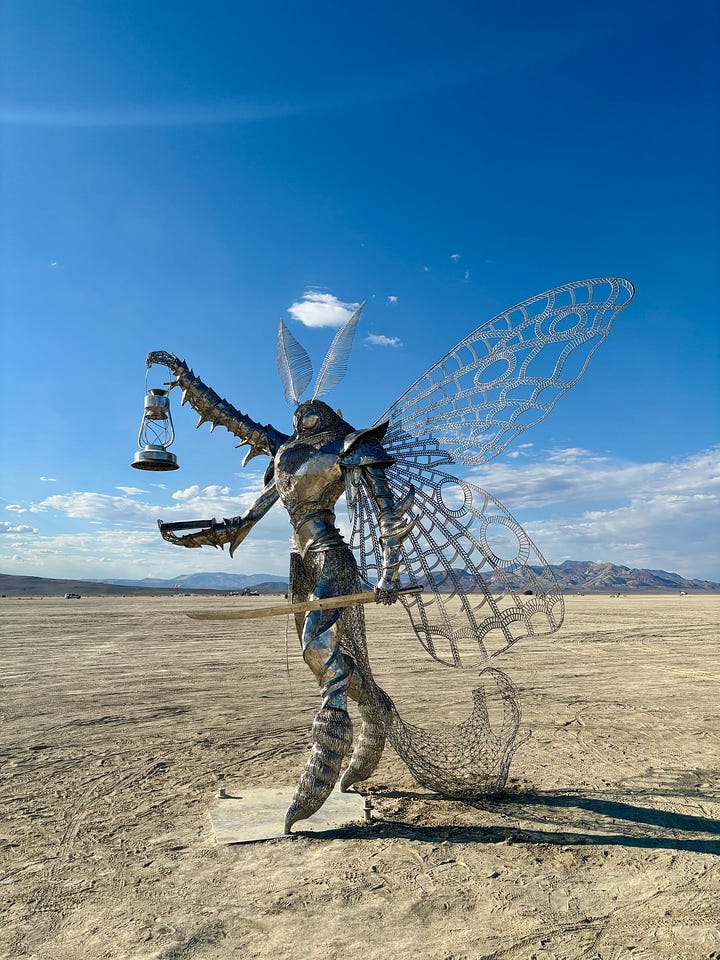
Agnes Callard writes in Aspiration that we must first imitate a new value we hope to embody before we can truly make them our own. In a sense, Burning Man is a laboratory of aspiration: for a week, each person is challenged to be more generous, more loving, more open, less self-conscious, than who they are in the “default world.” It is a collective game of play-pretend that allows us to try on new, perhaps freer, costumes of who we wish to become, so that we might feel more comfortable donning them in our regular lives.
I don’t know if or when I’ll return to Burning Man — I don’t like EDM, I’m a lousy hedonist, and I wilt when not in proximity to bodies of water. I’m not blind to its contradictions: a city devoted to decommodification that flaunts its decadence; the dissociative drug-fueled spectacles in pursuit of transcendence.
But it did imprint the belief that we can furnish a more convivial society in whatever corner of the world we return to. We can extend kindness to strangers without expecting anything in return. We can dare to try things beyond the bounds of what we think we are “good” at or capable of — I joined the Playa Choir with only a vague idea that I was maybe a soprano — knowing that aspiring beyond our current selves begins with a wobbly first step. We can engage in small acts of care, not because we are commanded to, but because the foundation of a good society is built by individuals who remain attentive and generous to one another even when it’s inconvenient, thankless, and hard.
All that being said: my copy of Bowling Alone is due back at the Black Rock City Public Library next August. Returning it — eventually — is a promise I intend to keep.


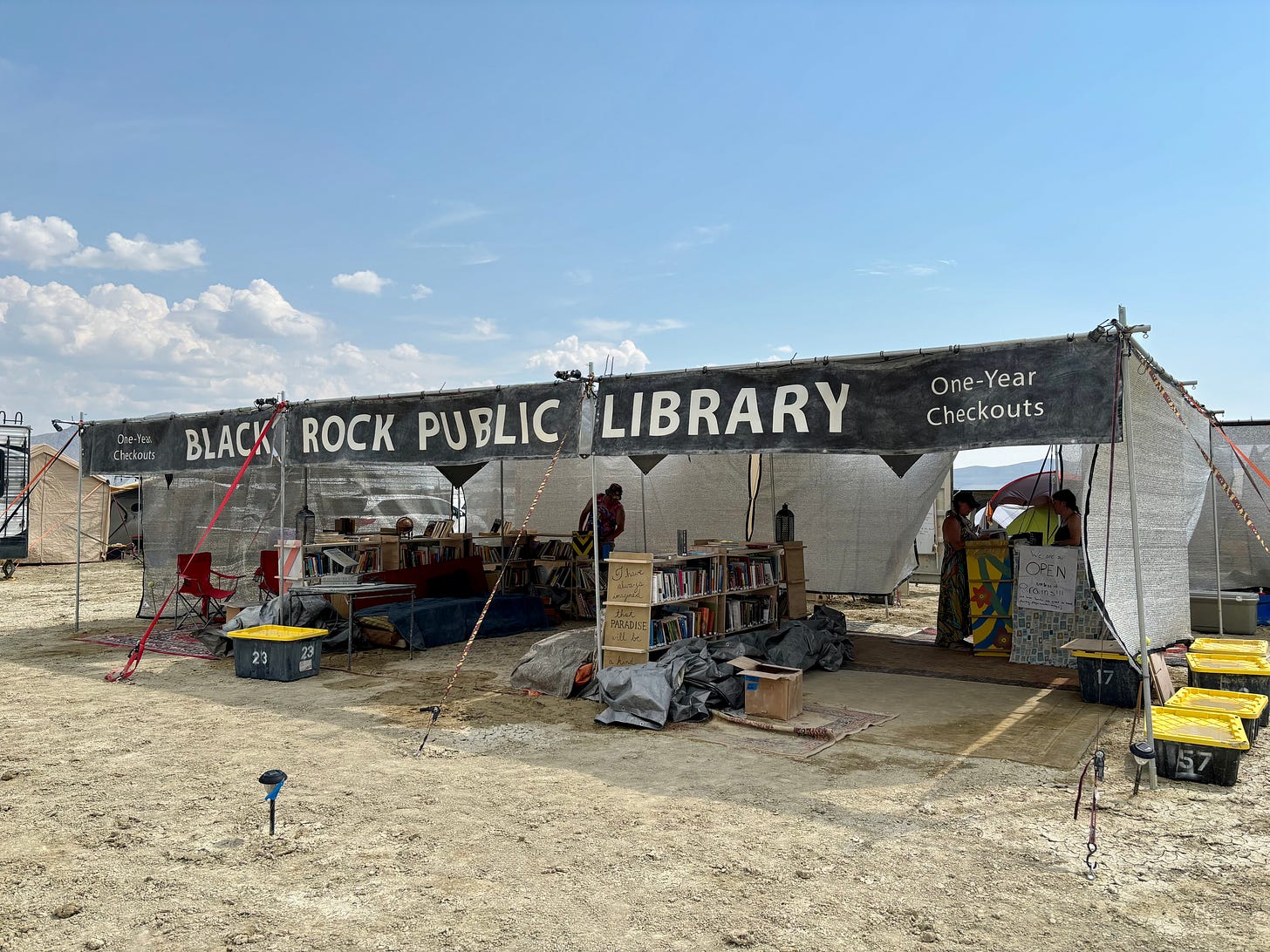

really cool concept // i wonder if it’s better with fewer people